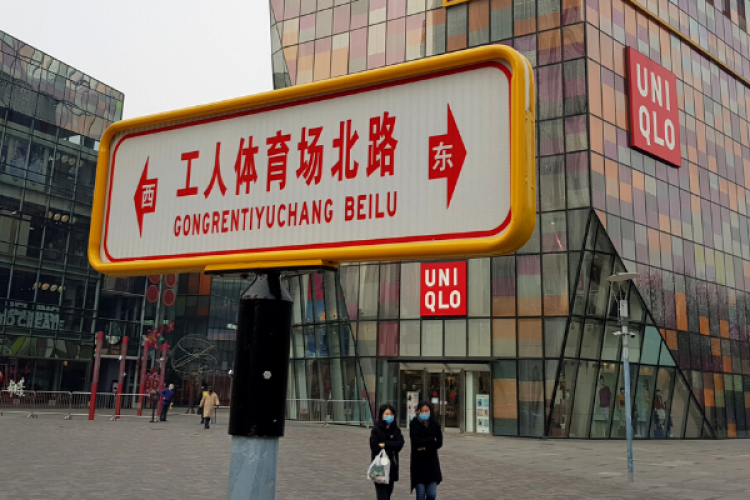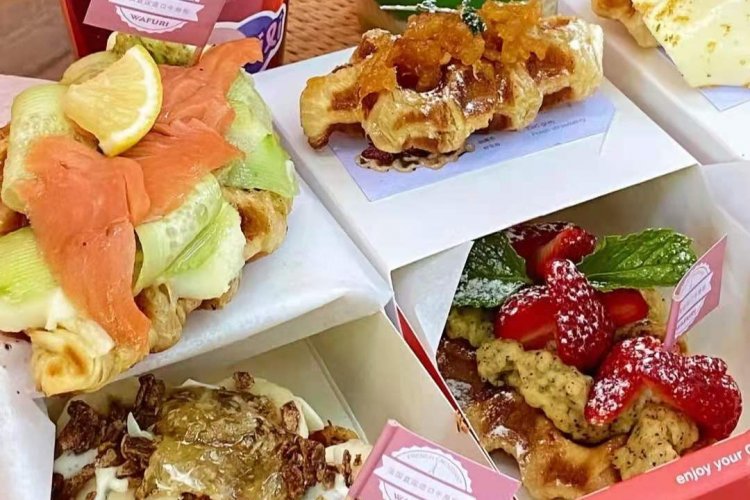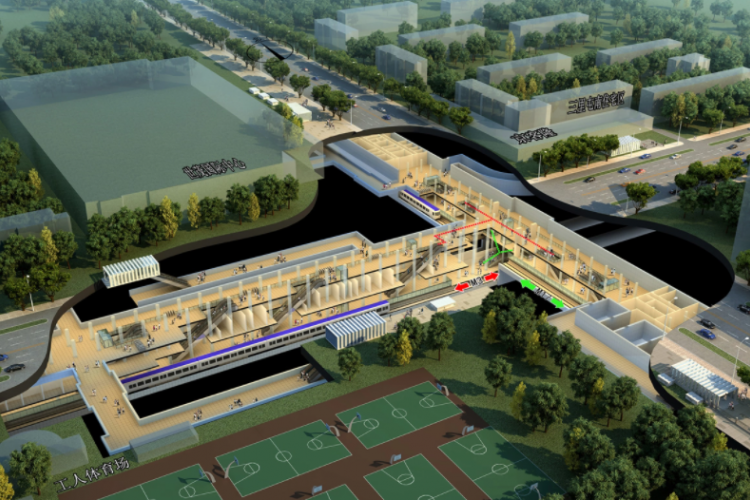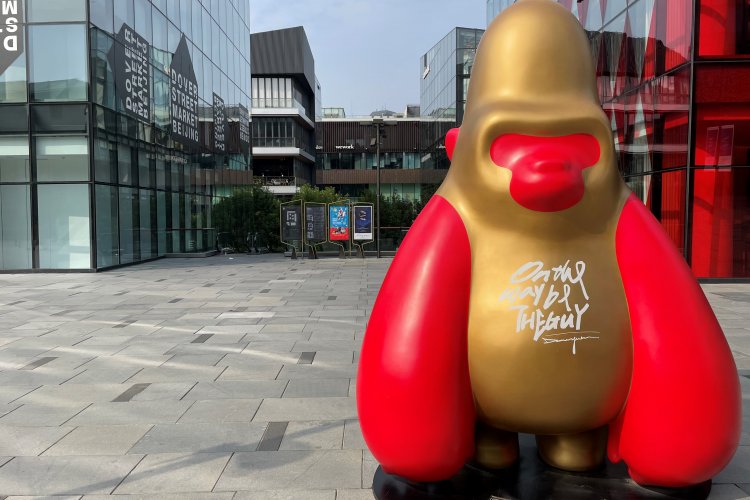The Reason Why You'll Never Go to Sanlitun Village Again
"Sanlitun Village" is no more. Just as we all got used to saying the name after it was changed from "The Village at Sanlitun," Swire Properties goes and changes it again. From today onwards, Sanlitun Village will be called Tai Gu Li (太古里), or Taikoo Li, if you prefer the Wade Giles spelling. The Opposite House came out with an official statement on Weibo today about the name change. Swire Properties apparently wants more credit for their Sanlitun behemoth, so they decided to brand it with the Chinese version of their company name. A bit narcissistic perhaps, but we'll see how quickly it catches on.
In the history of name changing, Tai Gu Li certainly isn't the worst. In 1990, Marathon changed its name to Snickers, in 1980s Britain Opal Fruits became Starburst (to match their American name) and the Sci Fi channel changed its name to Syfy in 2009.
Speculation is that the new name will make it easier for cab drivers but we've never had any trouble getting to Sanlitun Village or even The Village at Sanlitun. We'll try out Tai Gu Li tonight and see if the cabbies got the press release.
What do you think of Sanlitun Village's identity change? Let us know in the comments section below.
Related stories :
Comments
New comments are displayed first.Comments
![]() britomart
Submitted by Guest on Wed, 07/03/2013 - 08:54 Permalink
britomart
Submitted by Guest on Wed, 07/03/2013 - 08:54 Permalink
Re: The Reason Why You'll Never Go to Sanlitun Village Again
Perhaps it's time to stop beating this particular dead horse...?
![]() mtnerror
Submitted by Guest on Tue, 07/02/2013 - 14:39 Permalink
mtnerror
Submitted by Guest on Tue, 07/02/2013 - 14:39 Permalink
Re: The Reason Why You'll Never Go to Sanlitun Village Again
Don't be naive. Use of "village" in this context should not bring up images of small towns or hamlets. Ever heard of "The Village" in Lower Manhattan (Greenwich Village)? No one would confuse it with agrarian life . Village, in that the four-storey shops and walkways give one the feeling you're in an enclosed little area. And I see a heck of lot of Chinese, tourists and locals alike, snapping photos and getting together with friends. Don't be fooled for a minute that it's the only place in town that sells drinks for a mile-high price. There are plenty of nice restos in this city which sell various bottles of Yanjing and Tsingtao for ¥15-20 -- it's called retail pricing. In fact, I think nearly all the places sell drinks for a very affordable price and most are not selling the really nice scotch or wine, etc. If people like the establishment's vibe, they garnder a following and command such prices. Prices also include service charge/tip and tax, so the sticker price is not so out of whack as some may think. Chillax.
![]() alwn1708
Submitted by Guest on Tue, 07/02/2013 - 12:48 Permalink
alwn1708
Submitted by Guest on Tue, 07/02/2013 - 12:48 Permalink
Re: The Reason Why You'll Never Go to Sanlitun Village Again
Sanlitun is a couple of shopping arcades. This is the village I recently moved to, there is a difference.
Thought we had'nt seen you around for a while Herbz.That looks rather Leicestershire/Northants - ish?
![]() britomart
Submitted by Guest on Mon, 06/03/2013 - 10:32 Permalink
britomart
Submitted by Guest on Mon, 06/03/2013 - 10:32 Permalink
Re: The Reason Why You'll Never Go to Sanlitun Village Again
Nice. Where is that? Looks like a small English village.
![]() Herbz
Submitted by Guest on Sun, 06/02/2013 - 21:02 Permalink
Herbz
Submitted by Guest on Sun, 06/02/2013 - 21:02 Permalink
Re: The Reason Why You'll Never Go to Sanlitun Village Again
Sanlitun is a couple of shopping arcades. This is the village I recently moved to, there is a difference.
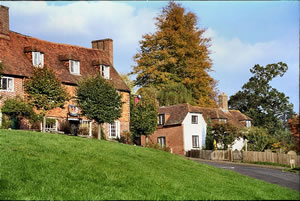
![]() britomart
Submitted by Guest on Tue, 05/28/2013 - 14:44 Permalink
britomart
Submitted by Guest on Tue, 05/28/2013 - 14:44 Permalink
Re: The Reason Why You'll Never Go to Sanlitun Village Again
Thanks, admin.
Just had a friend who moved from Xingfu'ercun to north Xizhimen area, partly due to better rent but partly due to safety. She commented that she no longer felt safe in that area; she'd been living in that particular neighborhood for about four years (in China for 20+ years). Was curious if that was just her impression, due to a few bad experiences, or if others living in the area for a while had had a similar impression.
![]() admin
Submitted by Guest on Tue, 05/28/2013 - 12:03 Permalink
admin
Submitted by Guest on Tue, 05/28/2013 - 12:03 Permalink
Re: The Reason Why You'll Never Go to Sanlitun Village Again
By the way... Don't know if this is the place to ask... But have been hearing random reports from friends and acquaintainces about evening muggings or just plain attacks targetting women around the Sanlitun/Xingfu'ercun area?Anyone have recent experience with this?
Happens a lot. It's never as safe as you imagine. But as to whether its happening more often than usual, I'd say no, there seems to be these sorts of things happening rarely but consistently over time.
I do not attribute it to rising danger, but rather people doing silly things they'd never do in their home country but do it here because they believe it to be safer -- things like drinking to excess and stumbling out of a bar alone down a dark hutong in search for a cab. No one deserves to be attacked of course -- but a heavier application of a common sense is called for.
Don't do anything in Sanlitun you wouldn't do in NYC, London or any other major metropolis.
![]() britomart
Submitted by Guest on Fri, 05/24/2013 - 16:31 Permalink
britomart
Submitted by Guest on Fri, 05/24/2013 - 16:31 Permalink
Re: The Reason Why You'll Never Go to Sanlitun Village Again
By the way... Don't know if this is the place to ask... But have been hearing random reports from friends and acquaintainces about evening muggings or just plain attacks targetting women around the Sanlitun/Xingfu'ercun area?
Anyone have recent experience with this?
![]() The Beijing Deva
Submitted by Guest on Fri, 05/24/2013 - 15:08 Permalink
The Beijing Deva
Submitted by Guest on Fri, 05/24/2013 - 15:08 Permalink
Re: The Reason Why You'll Never Go to Sanlitun Village Again
I need to travel out a couple hours at least from a major city, and being a capital city that's going have to be another hour at least.
Yes, yes you do. Preferably to a village that has no internet access or 3G signal. Please for all our sakes do this right now.
I rarely venture to Sanlitun because I find it is often filled, ironically enough, with 'OH MY GOD LOOK AT ME HOW AWESOME AND COSMOPOLITAN AND WELL TRAVELLED I AM ME ME ME ME ME ME' types much like yourself.
![]() admin
Submitted by Guest on Sun, 05/05/2013 - 04:47 Permalink
admin
Submitted by Guest on Sun, 05/05/2013 - 04:47 Permalink
Re: The Reason Why You'll Never Go to Sanlitun Village Again
awesome post, cthomson ... got any more old shots of sanlitun?
![]() cthomson
Submitted by Guest on Sat, 05/04/2013 - 23:02 Permalink
cthomson
Submitted by Guest on Sat, 05/04/2013 - 23:02 Permalink
Re: The Reason Why You'll Never Go to Sanlitun Village Again
You are calling a part of a capital city "village"? We don't call parts of England hamlet anymore. At least I don't hear Britons talking to me in those terms, and they DEFINITELY don't replace hamlet for village.One definition of "village" is "A small group of dwellings in a rural area". Beijing is not rural in my mind, it is urban. Maybe if you go to Pinggu and outer districts you can get by with it because of the size of Beijing. But in the center? Are you serious? A village? I don't think so.
http://en.wikipedia.org/wiki/Greenwich_Village
Anyway, "Beijing" has a unique spatial/spiritual layout in the minds of local Beijing people and those of us foreigners that have been here long enough. For hundreds of years, places outside of 2nd ring road were considered "outside the city". Sanlitun was the village three miles from the city. This is living breathing history for the older generations that remembers the walls and gates. I'm not even that old and I remember Xiushui literally being the edge of town when I was a kid. This mental map is constantly reinforced by the places names we hear everyday. Some of these names such as zhongguancun, yayuncun, etc. hold the word "village" because that's what they were just a generation back. Others such as dongzhimennei/wai, chaoyangmennei/wai, reinforce the idea of inside/outside the city. Some of the names such as tieshizifen (for beishida east gate) are rarely used except among old Beijing people and remind us of the history that connects us to an older generation. And the archways and markers around the city, such as the arches on guozijian, delineate a spiritual boundary or edge that you can not see but that history has painted on the map.
I love that Beijing is a huge city now. But its history is what gives us its depth. Seems like every year now, more of the past is scrubbed away.
Sanlitun certainly felt like a village, not that long ago. See this photo from 1982:

![]() THE drive-thru
Submitted by Guest on Sat, 05/04/2013 - 20:39 Permalink
THE drive-thru
Submitted by Guest on Sat, 05/04/2013 - 20:39 Permalink
Re: The Reason Why You'll Never Go to Sanlitun Village Again
www.beijingdrivethru.com
![]() bottle-o
Submitted by Guest on Thu, 05/02/2013 - 17:01 Permalink
bottle-o
Submitted by Guest on Thu, 05/02/2013 - 17:01 Permalink
Re: The Reason Why You'll Never Go to Sanlitun Village Again
Really? I've never had a taxi driver understand "The Village"
Dude, I have.
I will tell them Sanlitun and they will often look at my laowainess and reply with a proud "ah, 三里屯 hui li zhi! 是不是!!?"
Taxi drivers have that sh*t down... now they gon' go ahead and screw it up again. Just mean.
@Jadarite, you are the reason I go to the village and drink delicious, expensive cocktails and imported beer. Every time I step into a hutong I find myself surrounded by self-important, mouthy hippies like you. Agh.
Live here a few more years, precious and you will realize that the best thing about Beijing is the diversity and the ability to live whatever lifestyle you desire. Squat toilets and cat-meat-chuan'r one day then martinis and filet mignon the next. Don't hate, appreciate.
![]() RFParsley
Submitted by Guest on Thu, 05/02/2013 - 14:53 Permalink
RFParsley
Submitted by Guest on Thu, 05/02/2013 - 14:53 Permalink
Re: The Reason Why You'll Never Go to Sanlitun Village Again
I hope 3.3 doesn't change its name.
That's the only name I ever give cabbies~
![]() cowboy123
Submitted by Guest on Thu, 05/02/2013 - 14:11 Permalink
cowboy123
Submitted by Guest on Thu, 05/02/2013 - 14:11 Permalink
Re: The Reason Why You'll Never Go to Sanlitun Village Again
Really? I've never had a taxi driver understand "The Village"
"Speculation is that the new name will make it easier for cab drivers but we've never had any trouble getting to Sanlitun Village or even The Village at Sanlitun."
![]() admin
Submitted by Guest on Thu, 05/02/2013 - 10:46 Permalink
admin
Submitted by Guest on Thu, 05/02/2013 - 10:46 Permalink
Re: The Reason Why You'll Never Go to Sanlitun Village Again
Good analysis. So there is no name in Chinese characters?
太古里
![]() stylites
Submitted by Guest on Tue, 04/30/2013 - 14:08 Permalink
stylites
Submitted by Guest on Tue, 04/30/2013 - 14:08 Permalink
Re: The Reason Why You'll Never Go to Sanlitun Village Again
Good analysis. So there is no name in Chinese characters?
![]() stylites
Submitted by Guest on Tue, 04/30/2013 - 14:04 Permalink
stylites
Submitted by Guest on Tue, 04/30/2013 - 14:04 Permalink
Re: The Reason Why You'll Never Go to Sanlitun Village Again
Oh c'mon. You really think Sanlitun is still about the foreigners?
I guarantee that 90% of the spending at those boutiques is by holders of Chinese passports. Furthermore, can you even divide between foreigners and Chinese when it comes to a place like Sanlitun? I bet 60% of the overall spending in the former village is by returnees, Chinese-born holders of foreign passports, and people from HK and Taiwanese. What dichotomy are you still hung-up on again?
![]() admin
Submitted by Guest on Mon, 04/29/2013 - 14:42 Permalink
admin
Submitted by Guest on Mon, 04/29/2013 - 14:42 Permalink
Re: The Reason Why You'll Never Go to Sanlitun Village Again
Isn't 'Tai koo' a brand of sugar lumps?!?!
yep
Same conglomerate
![]() Bambi508
Submitted by Guest on Mon, 04/29/2013 - 14:02 Permalink
Bambi508
Submitted by Guest on Mon, 04/29/2013 - 14:02 Permalink
Re: The Reason Why You'll Never Go to Sanlitun Village Again
Isn't 'Tai koo' a brand of sugar lumps?!?!
![]() rhageman
Submitted by Guest on Mon, 04/29/2013 - 10:49 Permalink
rhageman
Submitted by Guest on Mon, 04/29/2013 - 10:49 Permalink
Re: The Reason Why You'll Never Go to Sanlitun Village Again
It was kind of fun reading this argument
![]() Manneken_Pis
Submitted by Guest on Mon, 04/29/2013 - 07:41 Permalink
Manneken_Pis
Submitted by Guest on Mon, 04/29/2013 - 07:41 Permalink
Re: The Reason Why You'll Never Go to Sanlitun Village Again
Nice - this is some old school Beijinger forum stuff. It's fun trying to guess whether people are trolling or serious.
On topic: The thing that bothers me most about the name change is the romanization of 古 as "koo" It just doesn't make sense. The English name isn't 'Taikoo,' it's 'Swire.'
We're in Beijing, where people speak Manadarin, and 'koo' isn't the way to pronounce 古. Spelling it that way just feels pretentious and as if they are looking down on Mandarin speakers.
I've heard the explanation that it makes it easier to tell cab drivers where to go - I call BS. If you say "tai koo li," I don't think he's going to understand, considering that it's not the proper Mandarin pronunciation.
They could have named it 太古里 in Chinese and Swire Village in English if they really wanted to rebrand it.
I get the feeling that naming it Tai Koo Li is an attempt (that may prove successful) to show Beijing that "our mall is a serious world-class shopping nexus with serious name brands that cost a lot of money and will get you lots of attention when you proudly wear them around town. In short: Tai Koo Li is not just better than Sanlitun Village, but better than Beijing."
![]() Monte
Submitted by Guest on Sun, 04/28/2013 - 20:02 Permalink
Monte
Submitted by Guest on Sun, 04/28/2013 - 20:02 Permalink
Re: The Reason Why You'll Never Go to Sanlitun Village Again
vmomo:
Maybe you should meet up with Jad and get to know him, I think I sense an attraction. 
![]() Monte
Submitted by Guest on Sun, 04/28/2013 - 19:59 Permalink
Monte
Submitted by Guest on Sun, 04/28/2013 - 19:59 Permalink
Re: The Reason Why You'll Never Go to Sanlitun Village Again
Jad........
"Dumb bum"!?? LOL LOL LOL LOL LOL!!! Ignorance IS bliss!
Relaaaaax...and ftr I am not your "mate"! LOL! Your comment is not even worth a response and I don't listen to advice from ignorant people. Don't need your vip "message"...I can shop/go wherever I want to! lol!!
Take a vacation, you really need it!
{Not checking this thread again so don't bother responding. Use your time to check into a chill-out spa.}
![]() vmomo
Submitted by Guest on Sun, 04/28/2013 - 18:09 Permalink
vmomo
Submitted by Guest on Sun, 04/28/2013 - 18:09 Permalink
Re: The Reason Why You'll Never Go to Sanlitun Village Again
God I love The Beijinger, this is one of the best comment threads I've read in a long time. I think you should give Jadarite a regular blog.
Gonna miss you guyz.
![]() jadarite
Submitted by Guest on Sun, 04/28/2013 - 13:30 Permalink
jadarite
Submitted by Guest on Sun, 04/28/2013 - 13:30 Permalink
Re: The Reason Why You'll Never Go to Sanlitun Village Again
[do you mean to say that you have NEVER patronized ANY of these types of establishments (run and/or visited by foreigners) since your arrival in China??]
No, use common sense. I went there and that was what I experienced. Of course I "patronized" them.
That's how I come to conclusions dumb bum.
I am speaking through experience "mate". I want to make sure this message gets out to all foreigners, not just the "yanks" back in my homeland.
![]() Monte
Submitted by Guest on Sun, 04/28/2013 - 11:01 Permalink
Monte
Submitted by Guest on Sun, 04/28/2013 - 11:01 Permalink
Re: The Reason Why You'll Never Go to Sanlitun Village Again
acb: Well said!
![]() Monte
Submitted by Guest on Sun, 04/28/2013 - 10:59 Permalink
Monte
Submitted by Guest on Sun, 04/28/2013 - 10:59 Permalink
Re: The Reason Why You'll Never Go to Sanlitun Village Again
@ Jadarite
First off, relax a litle; sounds like you need a mini vacay at best. lol.
Secondly, do you mean to say that you have NEVER patronized ANY of these types of establishments (run and/or visited by foreigners) since your arrival in China??
![]() admin
Submitted by Guest on Sun, 04/28/2013 - 10:21 Permalink
admin
Submitted by Guest on Sun, 04/28/2013 - 10:21 Permalink
Re: The Reason Why You'll Never Go to Sanlitun Village Again
A play on words is when you apply double meanings. I hope you look this up.
er, ok
http://en.wikipedia.org/wiki/Word_play
Word play is a literary technique and a form of wit in which the words that are used become the main subject of the work, primarily for the purpose of intended effect or amusement. Puns, phonetic mix-ups such as spoonerisms, obscure words and meanings, clever rhetorical excursions, oddly formed sentences, and telling character names are common examples of word play.
![]() admin
Submitted by Guest on Sun, 04/28/2013 - 10:19 Permalink
admin
Submitted by Guest on Sun, 04/28/2013 - 10:19 Permalink
Re: The Reason Why You'll Never Go to Sanlitun Village Again
why not spend less time getting angry over such things and do what makes you happy in any number of cool places or activities (local and foreign) this city has to offer?
I like that kinda statement -- thanks acb
![]() acb
Submitted by Guest on Sun, 04/28/2013 - 09:13 Permalink
acb
Submitted by Guest on Sun, 04/28/2013 - 09:13 Permalink
Re: The Reason Why You'll Never Go to Sanlitun Village Again
Wow. How about if you don't like it there don't go - shouldn't bother anyone else.
How about if people do want to go for whatever reason it shouldn't bother you.
I'm not sure anyone is thinking of you when they pay extra for their beer. Bit unfortunate you think about them so much when they do.
Beijing is a great city - why not spend less time getting angry over such things and do what makes you happy in any number of cool places or activities (local and foreign) this city has to offer?
Beijing has been a cultural melting pot for most of its history and still is. A huge amount of places and people here are foreign, either by native Beijinger or Chinese standards.
![]() jadarite
Submitted by Guest on Sun, 04/28/2013 - 06:30 Permalink
jadarite
Submitted by Guest on Sun, 04/28/2013 - 06:30 Permalink
Re: The Reason Why You'll Never Go to Sanlitun Village Again
[Actually, it's a play on the word "Sanlitun".]
Play on words? They took village and they replaced it with village. That's not a play on words.
[I find Sanlitun Village to be a creative]
Yea, so creative. They added a "village" so it is like "Sanli village village". Amazing creation. Maybe I am not smoking enough these days, but I don't see any creativity in stuttering.
A play on words is when you apply double meanings. I hope you look this up.
[It's full of people from all over the world, and most of them are Chinese.]
Chinese are "all over the world"? Why would I want to trap myself in a phone booth with Chinese people when I live in China? I can go anywhere in China and see Chinese people. Why go to one street that is marketing naive foolish foreigners who will pay 40 RMB for a 10 RMB bottle of beer?
[This argument about the "expat bubble" is tired and lazy]
Then pay the extra for the beer and snub your nose at me. I don't care.
Until you renounce your citizenship and throw away your passport, you are not an EXPATRIATE. Don't say "expat", makes you sound like some government appeasing bimbo who will give up their national rights but not have the courage to actually leave their country completely, using their country as a security blanket "in case" something bad happens abroad.
[Great name change,it sounds like "Tai Gui Le" - too expensive!!!!]
Now we are talking. That is the shortest reply but most accurate.
![]() alwn1708
Submitted by Guest on Sat, 04/27/2013 - 21:06 Permalink
alwn1708
Submitted by Guest on Sat, 04/27/2013 - 21:06 Permalink
Re: The Reason Why You'll Never Go to Sanlitun Village Again
Great name change,it sounds like "Tai Gui Le" - too expensive!!!!
![]() Iain S
Submitted by Guest on Sat, 04/27/2013 - 14:53 Permalink
Iain S
Submitted by Guest on Sat, 04/27/2013 - 14:53 Permalink
Re: The Reason Why You'll Never Go to Sanlitun Village Again
Jadarite, have you been to Sanlitun anytime in the last 10 years? It's full of people from all over the world, and most of them are Chinese.
The Chinese seem to like hanging out in the Village at least as much as foreigners do, I would say more so. There are several foreign-run businesses in the Village, and more on Sanlitun Houjie. The food in general might not be the most authentic, but come on, it's a shopping mall - try eating in any British shopping centre and see how your microwaved lasagne goes down.
This argument about the "expat bubble" is tired and lazy, and the people making the accusations are often the ones who sound more out of touch with reality.
Believe it or not, not all "cultural immersion" needs to happen while wearing a string vest in a hutong.
Silly name change though. Agreed.
![]() admin
Submitted by Guest on Sat, 04/27/2013 - 13:59 Permalink
admin
Submitted by Guest on Sat, 04/27/2013 - 13:59 Permalink
Re: The Reason Why You'll Never Go to Sanlitun Village Again
Maybe sanlitun, but it is an illogical label. You are calling a part of a capital city "village"?For a village, I need to travel out a couple hours at least from a major city, and being a capital city that's going have to be another hour at least.
Actually, it's a play on the word "Sanlitun".
The Chinese word "tun" 屯 used in Sanlitun (三里屯) means "Village".
Hence, I find Sanlitun Village to be a creative (if somewhat multilingually redundant) English name for the place.
![]() macasinbin
Submitted by Guest on Sat, 04/27/2013 - 12:25 Permalink
macasinbin
Submitted by Guest on Sat, 04/27/2013 - 12:25 Permalink
Re: The Reason Why You'll Never Go to Sanlitun Village Again
Who cares? Who says you have to live a completely western or eastern lifestyle? most foreigners do both! Don't be so judgemental! Make use of everything that is available! Chinese and foreign, its nothing to do with being in a "bubble." That's a narrow minded view in itself!
![]() Jerry
Submitted by Guest on Sat, 04/27/2013 - 11:53 Permalink
Jerry
Submitted by Guest on Sat, 04/27/2013 - 11:53 Permalink
Re: The Reason Why You'll Never Go to Sanlitun Village Again
![]() Alex1981
Submitted by Guest on Sat, 04/27/2013 - 10:40 Permalink
Alex1981
Submitted by Guest on Sat, 04/27/2013 - 10:40 Permalink
Re: The Reason Why You'll Never Go to Sanlitun Village Again
well done, good for you
![]() jadarite
Submitted by Guest on Sat, 04/27/2013 - 09:55 Permalink
jadarite
Submitted by Guest on Sat, 04/27/2013 - 09:55 Permalink
Re: The Reason Why You'll Never Go to Sanlitun Village Again
This is a response to admin.
""Sanlitun Village" has a definite Beijing twist"
Maybe sanlitun, but it is an illogical label. You are calling a part of a capital city "village"? We don't call parts of England hamlet anymore. At least I don't hear Britons talking to me in those terms, and they DEFINITELY don't replace hamlet for village.
One definition of "village" is "A small group of dwellings in a rural area". Beijing is not rural in my mind, it is urban. Maybe if you go to Pinggu and outer districts you can get by with it because of the size of Beijing. But in the center? Are you serious? A village? I don't think so.
"its not contradictory to explore very Western things in Beijing and very Chinese things."
Ok, well, the German beer this American yank drinks at home is just as Western as the German beer he drank in Sanlitun. I don't feel any more Western by going to a designated street and trying to be western (and failing miserably at it).
If you are going to westernize a part of an Eastern country, then do a proper job of it. That's what I think. Get a real Mexican restaurant and do the tacos, burritos, and fajitas the right way. Get REAL tomato paste, not that ketchup stuff Chinese try to sell you to replace Italian spaghetti sauce. Get decent sausages and bacon. The stuff they have here is like chewing wax.
When I go to a Japanese restaurant with a Japanese owner, then it tastes like real Japanese food I had in Japan. I am all for remembering this and food back home, but if no one can whip up a Philly steak sandwich, Greek Gyro, or a Chicago deep dish pizza then you are not really getting best of both worlds. You are just having a fake representation of what Western food is really like. It's like saying wonton soup or fortune cookies. What about those California rolls, calling that Japanese sushi? It's just a fake moment I can't enjoy. I need the real stuff.
For a village, I need to travel out a couple hours at least from a major city, and being a capital city that's going have to be another hour at least.
![]() jadarite
Submitted by Guest on Sat, 04/27/2013 - 09:29 Permalink
jadarite
Submitted by Guest on Sat, 04/27/2013 - 09:29 Permalink
Re: The Reason Why You'll Never Go to Sanlitun Village Again
This is a response to Squid.
"Do you say the same thing about all the Chinese in Chinatowns around the world?"
No, because in Chinatowns they usually have Chinese people selling stuff. You are making a completely bad analogy. Do you work at Uniqlo or any of these stores? Even that, those are not YOUR country's products. It's just a franchised store.
If Chinese people came to America and did not interact with the locals, yes I would say the same thing. Instead, I see many Arabs, Indians, Chinese, Japanese, and Koreans back in my home country running a restaurant or food store. I sold my house to an Arab who ran a wine shop. Another one had a golf store.
Are you telling me that these people that come to Sanlitun have offices and stores there? They are not going for the drinks and shops (as customers)?
![]() admin
Submitted by Guest on Sat, 04/27/2013 - 09:03 Permalink
admin
Submitted by Guest on Sat, 04/27/2013 - 09:03 Permalink
Re: The Reason Why You'll Never Go to Sanlitun Village Again
I don't get it. Who cares what you call it?
The reason I don't like the name change is that "Taikoo" is totally not Beijing. It's the name of a well-known Hong Kong conglomerate. Its very closely associated with Hong Kong.
"Sanlitun Village" has a definite Beijing twist -- Sanlitun is uniquely Beijing and Village gives it a bit of charm.
Now, isn't that a more important topic than a name (change) of some overpriced shopping and drinking area for foreigners who can't find the exit door to their Western bubble they live in?
I suppose you have a point there. But I think if you spend enough time in Beijing you'll eventually realize that it's OK to want to have the feel of something familiar back home when you are living overseas, and that its not contradictory to explore very Western things in Beijing and very Chinese things.
![]() coco-nuts
Submitted by Guest on Sat, 04/27/2013 - 08:23 Permalink
coco-nuts
Submitted by Guest on Sat, 04/27/2013 - 08:23 Permalink
Re: The Reason Why You'll Never Go to Sanlitun Village Again
Hope my nifty GPS catches up soon. Was completely lost last evening.
![]() squid
Submitted by Guest on Sat, 04/27/2013 - 07:28 Permalink
squid
Submitted by Guest on Sat, 04/27/2013 - 07:28 Permalink
Re: The Reason Why You'll Never Go to Sanlitun Village Again
Jadarite,
Do you say the same thing about all the Chinese in Chinatowns around the world?
![]() jadarite
Submitted by Guest on Sat, 04/27/2013 - 06:19 Permalink
jadarite
Submitted by Guest on Sat, 04/27/2013 - 06:19 Permalink
Re: The Reason Why You'll Never Go to Sanlitun Village Again
A bunch of foreigners leave their home country, come to another country, and they spend it by congregating at a foreigner area. Itaewon in Korea, Sanlitun in China. I don't get it. Who cares what you call it? The question I have is why leave your country if you aren't going to immerse yourself in the culture of the country you seek living in? A bit of a boy in the bubble syndrome. Jung and Freud were probably too old to diagnose these kinds of people this way. Maybe Oliver Sacks has something.
I prefer wrapping my head around Chinese stuff like should I call it 木须肉 or 木樨肉 (xu or xi?) It shows xu on the menu, but when I hear people say it, they say xi.
Now, isn't that a more important topic than a name (change) of some overpriced shopping and drinking area for foreigners who can't find the exit door to their Western bubble they live in?
![]() bjman2013
Submitted by Guest on Fri, 04/26/2013 - 23:12 Permalink
bjman2013
Submitted by Guest on Fri, 04/26/2013 - 23:12 Permalink
Re: The Reason Why You'll Never Go to Sanlitun Village Again
Does anything happen around here that's NOT stupid?
![]() Bender3000
Submitted by Guest on Fri, 04/26/2013 - 22:55 Permalink
Bender3000
Submitted by Guest on Fri, 04/26/2013 - 22:55 Permalink
Re: The Reason Why You'll Never Go to Sanlitun Village Again
Why would you rebrand a brand like Sanlitun? Swire guys I love you, but that is just a stupid idea!
Validate your mobile phone number to post comments.

